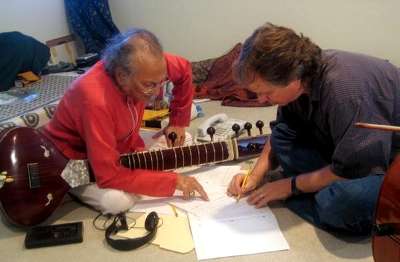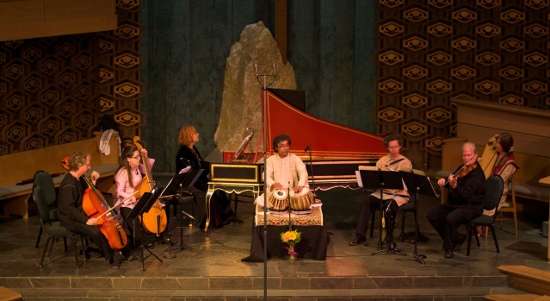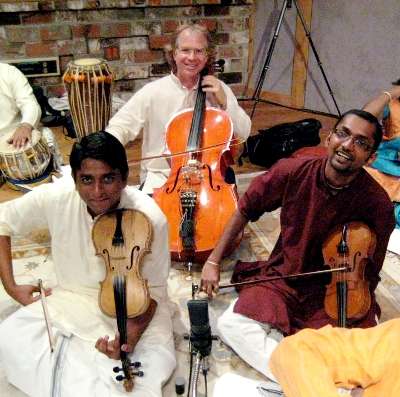Interview with Barry Phillips–a cellist with a difference

Barry Phillips is a cellist, musician, arranger and producer of many recordings of Celtic, world and American folk music.
Barry received a Masters of Music degree in composition from the San Francisco Conservatory of Music in 1990.
Barry has been closely associated with Pt. Ravi Shankar and has been his student since then. He was assisted Pt. Ravi Shankar in many compositions and concerts. He has been performing in various genres and experimenting with music to explore new horizons.
We had an email interview with Barry.
Q1. Going back to your childhood, tell us how you grew up liking music?
My earliest music memory is my mother singing to me at night, age 2 or so–the memory is vivid and I remember it as a sort of magic and human connection through vibration–a very strong memory. Also my mother’s mother played the electric organ by ear and I was really impressed with that. By age 8, I started regular western piano lessons but also the Beach Boys and Beatles were putting out their first albums and that’s when I really jumped in and became a drummer, age 8, in a band with my brother and his friends. That band was a serious endevor, at least as serious and dedicated as we could be at that age. We thought it was the best thing in the world!
Q2. Talking about picking up cello as your favorite instrument, what was the main point that you picked it?
I stayed a drummer (as well as continuing with piano) all through high school. Also at high school I took up the cello and that is the instrument that I’ve taken to all these years. The cello allowed me to play classical and rock/pop. It was both classical music in general and also the Beatles cello parts that got me thinking of the cello for myself. Overall, the cello is very much like a voice – I have the almost exact same vocal range as the cello, and I just love the rich bass too.
Later on was able to thank George Harrison personally for his music and the cellos that he seemed to use a lot – that was a thrill for me.
 Q3. Tell us something about your training and tutelage in music and how was the experience back then.
Q3. Tell us something about your training and tutelage in music and how was the experience back then.
I started as a self trained musician. I think this is good and bad in many ways. My beginning in music was not a concentrated beginning, but a long process spread out over time as a self taught player of drums, piano and cello. The positive to this might be that I do pretty well blending into a music situation and making a cello part that sounds fairly good fairly quickly. The down side is that there are some technical things I cannot do well that I will not describe in detail! 🙂
Eventually I went to Western Washington University as a composer/cellist where I started proper training in both areas, and then on to the San Francisco Conservatory of Music where I completed a Master’s of Music in composition, but along the way I took cello lessons. 7 years after graduating from the Conservatory I began cello lessons with Guruji Ravi Shankar. Playing ragas as he composes them is a real challenge for me – something I love to do and am grateful for the opportunity.
Q4. You have collaborated with lots of musicians in various genres. Tell us something about your experience.
I’ve had the opportunity to play with really good players, both famous and not so, and it’s been great for me.
I love playing with singer/songwriters and it gets back to the Beatles and the way their arranger George Martin made such exciting cello part that perfectly fit the songs. I’ve played with some fantastic singer/songwriters like Ariel Theirmann, Jesse Autumn, the British band Camel, and most recently the American band Weezer. Of course, playing at the Concert for George was both the happiest and saddest (absolutely simultaneous strong feelings! – joy and pain) concert of them all. To play Beatle songs with Paul and Ringo there on stage – this computer doesn’t have the keys to describe that. They were all kind and wonderful to be around as well.
My first big dive into Scottish music was playing on a cd of “somewhat composed” arrangements with master Scottish fiddler Alasdair Fraser. It was very exciting and a challenge to play both folky and composed parts and have as much Scottish accent in my playing as possible. Then joined English guitarist Martin Simpson’s band in the mid ’90’s and this allowed me room for improvised solos, folk tunes and bass playing along with original and traditional songs.
Playing in the Anoushka Shankar Project has been my biggest challenge and joy musically. Everyone in that band is absolutely top notch in their field and I have my self-trained cello playing both helping and hurting my abilities. Overall, I love it and I feel very useful and happy in that group.
Q5. Tell us something about the significance of Cello and how it brings different elements than a violin.
The cello is an octave and a half lower than a usual violin. This means the cello often takes low and bass parts. Also the strings are maybe twice the length if a violin, so there might need to be fewer notes in a cello part out of physical stamina limitations. That being said, and with cellos such as mine having an extra higher string, and violins often having an extra lower string these days – cello and violin overlap and share the same music sometimes. Overall, I’d like to hope cello and violin can do almost the same thing, maybe a few less notes in the cello and sounding a bit lower, but that’s all.

Q6. Your collaboration with Indian musicians brings an interesting question—Indian musicians do not write music when they perform whereas Western music depends upon sheets. How was the experience in making music which is so diverse and different?
This is where being self taught helps. I learned to be a performing musician before I could read music. So I am often comfortable without paper. Still, with complicated music as the Ravi Shankar compositions we performed last September at the Hollywood Bowl for something like 30 musicians where I was the only western musician there, we all took notes, in sargam and I took notes in sargam and western notations. If I have to play fast I write in western and if I play slower I write in sargam— just whatever is the most comfortable and gives the best outcome quickly–that’s what’s called for. The western musicians that I have known that pick up music the fastest are the ones that play by ear, and the even faster ones are Indian Indian musicians. But I know some Indian musicians that can read sargam rather quickly too!
Q7. Do you feel your music is influenced by some form of genre of music or any musician in particular?
My own music–the music I compose and perform is often a real combination of influences. For better or worse, my music has elements of Ravi Shankar, Beatles, Gustav Holst, Igor Stravinski, Johann Sebastian Bach, fiddlers and folk musicians. I say “better or worse” as musical “fusion” frankly scares me a bit. It can often not be the BEST of various musical worlds, but a watering down and misunderstanding between genres. I just try very-very hard to be true to what I know and not pretend that I know more than I do, as much as I can–then pray!
 Q8. How satisfying has been the journey as a musician? How do you feel music helps in balancing the mind and being concentrated about the task at hand?
Q8. How satisfying has been the journey as a musician? How do you feel music helps in balancing the mind and being concentrated about the task at hand?
Overall, music as a life is very rewarding and satisfying. But I would be misleading you to make it seem stress-free or easy. There have been many many hard times, mostly financially. Most the musicians I know go through lean times and this leads them into another field out of necessity, or they somehow pull through and stay in music. I suppose that builds character – right! So the music as a business – not so stress-free, but music as an art form and a life–wonderful.
The people I have been lucky enough to make music with, their fine artistry and wonderfulness as human beings–this is a blessing that can not be described.
There has been great joy and great depth of sadness – maybe a musical life stresses these emotions as they are being lived like a movie underscore enhances emotions. It is a great joy making music–it is reaching deep into ones soul and seeing what is there–I love this about making music.
Q9. Do you feel you could have picked up something else if it was not music?
I love woodworking–it is the family vocation. I am quite happy to be a woodworker. My father trained me as a woodworker as did his father and his father’s father, and I don’t know how far back that goes. I am sure I would have been a woodworker of some sort. I have built keyboard instruments called clavichords, and I hope to do that again one day. Of course, doing that as a business is harder than doing it for the love of woodworking. Still, I would think I would be in woodcrafting of some sort.
Q10. What you would like to convey to our readers?
I feel daily thanks to the friends family and teachers that have helped me along the way. I have many things I want to continue to do in music. I feel like I am trying to find the real me when I compose music or perform on cello and I hope to keep at it for a long time to come.
Guruji Ravi Shankar is 90th year now and I think of him daily and look forward to visits and future projects with him–this is something that keeps me going!

 Album Review—Inner Sanctum
Album Review—Inner Sanctum  Album review—Back To My Roots
Album review—Back To My Roots  Album Review—Days of Gypsy Nights
Album Review—Days of Gypsy Nights  Album Review—Open by Stephen Wallack
Album Review—Open by Stephen Wallack